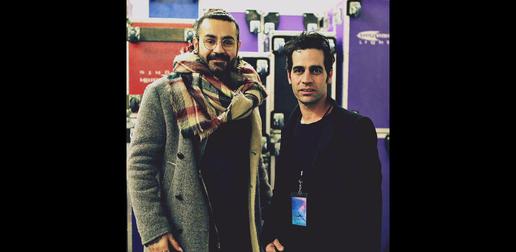In this series on self-censorship, we asked writers, artists, journalists and human rights activists to define self-censorship. Where possible, they are invited to give examples of their experiences, and to describe what they have witnessed.
We presented each interviewee with the same set of questions, adapting them or asking further questions where relevant.
Our intention was not to challenge the interviewees. We wanted them to express their own perspective of self-censorship.
***
Shahin Najafi is an Iranian musician, songwriter and singer known for his taboo-breaking and provocative songs about religion, poverty, child labor, sexism and other topics Islamic Republic officials would like to avoid. Najafi escaped Iran in 2005 after he was sentenced to three years in prison and 100 lashes in connection with his lyrics. In 2012, Grand Ayatollah Lotfollah Safi Golpayegani and a number of other Shia clerics issued a fatwa calling for Najafi’s death following the release of a song called Naqi, which included a satirical reference to the 10th Shia Imam.
Najafi now lives in Germany, where he continues to work. His most recent performance was a joint concert in Tel Aviv with the Israeli musician Aviv Geffen.
How do you define self-censorship?
Self-censorship is a form of defense and self-preservation when we are confronted by others. This is especially true when it comes to arts. With self-censorship, we safeguard some of our political, social and financial interests and avoid revealing ourselves. It is basically a self-defense mechanism.
Is self-censorship an example of social misconduct or prudence?
In arts self-censorship is closer to prudence. It seems to be an individual choice but it is a form of reaction to social and political pressures. As far as it is an individual choice, my belief is that art is contrary to prudence. It is this seemingly individual choice which then becomes a social phenomenon and turns into the general behavior of individuals and institutions. It is these acts of self-censorship and censorship that drags the society into triviality and indifference.
Iran is a self-censoring society. Is this self-censorship rooted in Iranian culture or in its history and political events?
I do not agree with this reductionist view of Iranian culture that turns it into an absolute evil and says that we Iranians are self-censors, that we are bad and so on. Undoubtedly we suffer from serious and deep-seated cultural problems but this is not a problem particular to a geographic boundary. We must look into the roots of the problems. We should not paint ourselves as a bunch of barbarians and know-nothings and then contrast it with the West as the model of humanity and human culture.
Self-censorship is a defense mechanism against external and internal pressures. Self-censorship originates from fear and we must understand what those fears are. These fears are different in the US and Germany and France and Africa and Iran and Indonesia. The differences are directly and closely connected to the material life of the people, the lineup of political forces and institutions, geography and the very important factor of language in its historical and structural aspects. We should judge a country and its people based on these factors.
From this point of view, self-censorship is a result of history and language, how the natives understand sexuality and the kind of political interactions within that society. The person who commits self-censorship conceals or eliminates part of himself or his works for self-preservation or out of not wanting to endanger his personal interests. The stronger and the more widespread these pressures, the more prudent and cowardly the artist becomes. We must be careful to define self-censorship in the context of the society at large and the dominant political power, and by taking into account the individual’s abilities. All these factors play a part in self-censorship.
Can you give us an example of when you have practiced self-censorship?
Definitely I have committed self-censorship. In my fight with society and the dominant political system and tradition and religion I have had to be constantly on guard not to upset anybody and, needless to say, this does not agree with how I work or with my ideas.
Around 10 years ago, I wrote two sharp-tongued works. They were ready to be recorded and released. One was about the Prophet Mohammad and the other was about Cyrus the Great. But I did not record them, not even for my own personal use. If they had been released in any way or form there could be no doubt that my Islamist and nationalist critics would have been much more angrier with me.
Of course now I am unhappy that I did not release them. I don’t like them any longer but the fact that I did not publish them at the time was certainly an act of self-censorship.
Was it because of prudence that you did not publish those two songs and censored yourself or there was some other reason?
At the time I believed I was not powerful enough and I had to wait until the time came. Just imagine that a few years later I did the song Naqi. It was not very sharp-tongued but were it not for my audiences and supporters inside and outside Iran, either domestic or foreign Islamists would have destroyed me. Or else, like others, I would have to find an occasion to apologize and repent every year.
A prudent and self-censoring artist would not have such a brave audience.
visit the accountability section
In this section of Iran Wire, you can contact the officials and launch your campaign for various problems


























comments